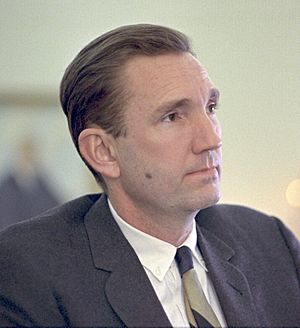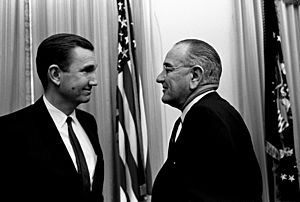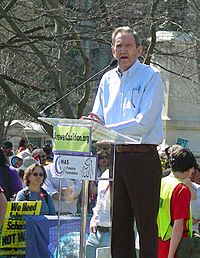Ramsey Clark facts for kids
Quick facts for kids
Ramsey Clark
|
|
|---|---|

Clark in 1968
|
|
| 66th United States Attorney General | |
| In office November 28, 1966 – January 20, 1969 Acting: November 28, 1966 – March 10, 1967 |
|
| President | Lyndon B. Johnson |
| Deputy | Warren Christopher |
| Preceded by | Nicholas Katzenbach |
| Succeeded by | John N. Mitchell |
| 8th United States Deputy Attorney General | |
| In office January 28, 1965 – March 10, 1967 |
|
| President | Lyndon B. Johnson |
| Preceded by | Nicholas Katzenbach |
| Succeeded by | Warren Christopher |
| United States Assistant Attorney General for the Environment and Natural Resources Division | |
| In office 1961–1965 |
|
| President | John F. Kennedy Lyndon B. Johnson |
| Preceded by | Perry W. Morton |
| Succeeded by | Edwin L. Weisl Jr. |
| Personal details | |
| Born |
William Ramsey Clark
December 18, 1927 Dallas, Texas, U.S. |
| Died | April 9, 2021 (aged 93) New York City, New York, U.S. |
| Political party | Democratic |
| Spouse |
Georgia Welch
(m. 1949; |
| Children | 2 |
| Relatives | Tom Clark (father) William F. Ramsey (grandfather) |
| Education | University of Texas, Austin (BA) University of Chicago (MA, JD) |
| Military service | |
| Allegiance | |
| Branch/service | |
| Years of service | 1945–1946 |
William Ramsey Clark (December 18, 1927 – April 9, 2021) was an American lawyer, activist, and government official. He worked in important roles for the United States Department of Justice under Presidents John F. Kennedy and Lyndon B. Johnson. He served as the United States Attorney General from 1967 to 1969. Before that, he was the Deputy Attorney General and Assistant Attorney General.
As Attorney General, Clark was known for being against the death penalty. He strongly supported civil liberties and civil rights. He also worked to make sure business laws were fair. Clark helped write important laws like the Voting Rights Act of 1965 and the Civil Rights Act of 1968.
After leaving government, Clark became involved in many campaigns for social change. He often gave legal advice or defended people in court. He passed away in 2021.
Contents
Ramsey Clark's Early Life and Education
Ramsey Clark was born in Dallas, Texas, on December 18, 1927. His father, Tom C. Clark, was also a famous lawyer. His father served as the U.S. Attorney General and later became a Supreme Court Justice. Ramsey's grandfather was also a judge.
Clark went to Woodrow Wilson High School in Washington, D.C. At 17, he left school to join the United States Marine Corps. He served in Europe during the last months of World War II until 1946. After the war, he went to college. He earned a Bachelor of Arts degree from the University of Texas at Austin in 1949. He then got a Master of Arts degree and a law degree from the University of Chicago in 1950 and 1951.
He became a lawyer in Texas in 1950. From 1951 to 1961, he worked at his father's law firm.
Working in Government: Kennedy and Johnson Years

During the presidencies of John F. Kennedy and Lyndon B. Johnson, Ramsey Clark held important jobs in the Justice Department. From 1961 to 1965, he was an Assistant Attorney General. He was in charge of the Lands Division, which dealt with government land issues. Then, from 1965 to 1967, he served as the Deputy Attorney General.
In 1967, President Johnson chose him to be the United States Attorney General. The Senate approved his appointment. People saw Clark as a skilled and independent leader. He was known for being a "New Frontier liberal," meaning he supported new ideas for social progress. He had a strong record of success, especially in managing the Justice Department's Lands Division. He made his division more efficient and even saved money.
During his time at the Justice Department, Clark played a big part in the civil rights movement. He helped:
- Oversee federal officials at the University of Mississippi when James Meredith became the first African American student there.
- Check on all school districts in the Southern U.S. that were ending segregation.
- Make sure federal rules protected the 1965 Selma to Montgomery marches.
- Lead a special team to Watts after riots happened there in 1965.
- Oversee the creation and passing of the Voting Rights Act of 1965 and the Civil Rights Act of 1968.
As Attorney General, Clark also oversaw a case involving people who opposed the Vietnam War. He later said he regretted that the government won the case. Clark served as Attorney General until President Johnson's term ended in 1969.
Ramsey Clark's Work After Government
After leaving his government job, Ramsey Clark taught law at universities. He was also very active in the movement against the Vietnam War. In 1972, he visited North Vietnam to protest the bombing there.
Clark also ran for U.S. Senator in New York in 1974 and 1976, but he did not win.
In 1979, during the Iranian hostage crisis, President Jimmy Carter asked Clark to go to Iran to try and negotiate for the release of American hostages. However, Iranian leaders would not let him enter the country. Clark went to Iran again in 1980, without permission from President Carter. He spoke about the hostages and also criticized past U.S. support for the former leader of Iran.
International Activism and Legal Defense
Ramsey Clark became well-known for his international activism. He often spoke out against wars and supported human rights around the world.
In 1991, Clark's group, the Coalition to Stop U.S. Intervention in the Middle East, was against the U.S.-led war and economic penalties against Iraq. He accused U.S. leaders of "crimes against peace" and "war crimes" for their actions. He also criticized NATO's actions in Yugoslavia in 1999.
As a lawyer, Clark was sometimes criticized for defending very controversial people, including foreign leaders. However, Clark believed that everyone deserved a fair trial. He stood by his clients, no matter what they were accused of.
In 2004, Clark joined a team of lawyers to defend Saddam Hussein in his trial in Iraq. Clark argued that the trial was not fair because it was set up after the U.S. war in Iraq. He said that for peace to happen, trials must be seen as "absolutely fair." Many human rights groups also criticized Saddam's trial for not being fair.
In 2006, Clark attended the funeral of Slobodan Milošević, a former leader. He said that Milošević's trial was also unfair. Clark believed that both Milošević and Saddam Hussein were brave leaders who fought against more powerful countries.
In 2007, Clark visited Nandigram in India, where there had been conflict between government forces and villagers. In an interview that year, he said that the "War on Terrorism" was a "war against Islam." In 2009, he spoke at a UN conference and discussed human rights issues related to Israel.
Ramsey Clark received several awards for his work. In 1992, he received the Gandhi Peace Award. In 1999, he received an honorary degree from Belgrade University. In 2008, the United Nations gave him its United Nations Prize in the Field of Human Rights for his strong belief in human rights and fair trials for everyone.
Efforts to Impeach George W. Bush
| Founded | 2002 |
|---|---|
| Dissolved | January 20, 2009 |
| Type | Political advocacy |
| Focus | Impeachment of Bush administration members |
| Location |
|
|
Area served
|
United States |
|
Members
|
Reported over 1,000,000 signatories |
|
Key people
|
Ramsey Clark (founder) |
In 2002, Clark started an organization called "VoteToImpeach." This group wanted to remove President George W. Bush and some members of his team from office. Clark tried to get the House of Representatives to start impeachment proceedings against Bush.
His organization created its own reasons for impeachment. They argued that Bush and others had violated the U.S. Constitution. They claimed these actions were "crimes against peace and humanity." VoteToImpeach said they collected over one million signatures supporting impeachment by 2009.
Ramsey Clark's Notable Clients
As a lawyer, Ramsey Clark provided legal help to many people, including some very controversial figures. He believed that everyone deserved a fair trial.
When he defended Saddam Hussein, Clark said that a fair trial was important for historical truth. He felt that the trial might not be fair and could cause more anger in Iraq. He believed that to achieve peace, the idea of "victor's justice" (where the winners of a conflict decide what is fair) must end.
Some of the people Ramsey Clark helped as a lawyer include:
- Lori Berenson, an American accused of supporting a group in Peru.
- Father Philip Berrigan, a Catholic priest and anti-war activist. Clark defended him and won the case.
- Jennifer Casolo, a church worker accused in El Salvador. Clark helped her defense, and she was released.
- Radovan Karadžić, a former politician from Bosnia. Clark represented him in a lawsuit about human rights issues.
- About 100 survivors and relatives from the Branch Davidian group. Clark represented them in a lawsuit after a tragic event in Waco, Texas.
- Lyndon LaRouche, a political figure.
- Leonard Peltier, an American Indian Movement prisoner.
- Elizaphan Ntakirutimana, a leader from the Rwandan genocide.
- Leaders of the Palestine Liberation Organization in a lawsuit.
- Charles Taylor, a former leader of Liberia.
Personal Life
Ramsey Clark married Georgia Welch in 1949. They had two children, Ronda and Tom. His wife passed away in 2010, and his son Tom passed away in 2013. Ramsey Clark lived in Greenwich Village in New York City. He died there on April 9, 2021, at the age of 93.
Images for kids
-
Ramsey Clark visiting Nandigram, India, November 2007
See also
 In Spanish: Ramsey Clark para niños
In Spanish: Ramsey Clark para niños
- List of peace activists
 | Stephanie Wilson |
 | Charles Bolden |
 | Ronald McNair |
 | Frederick D. Gregory |



